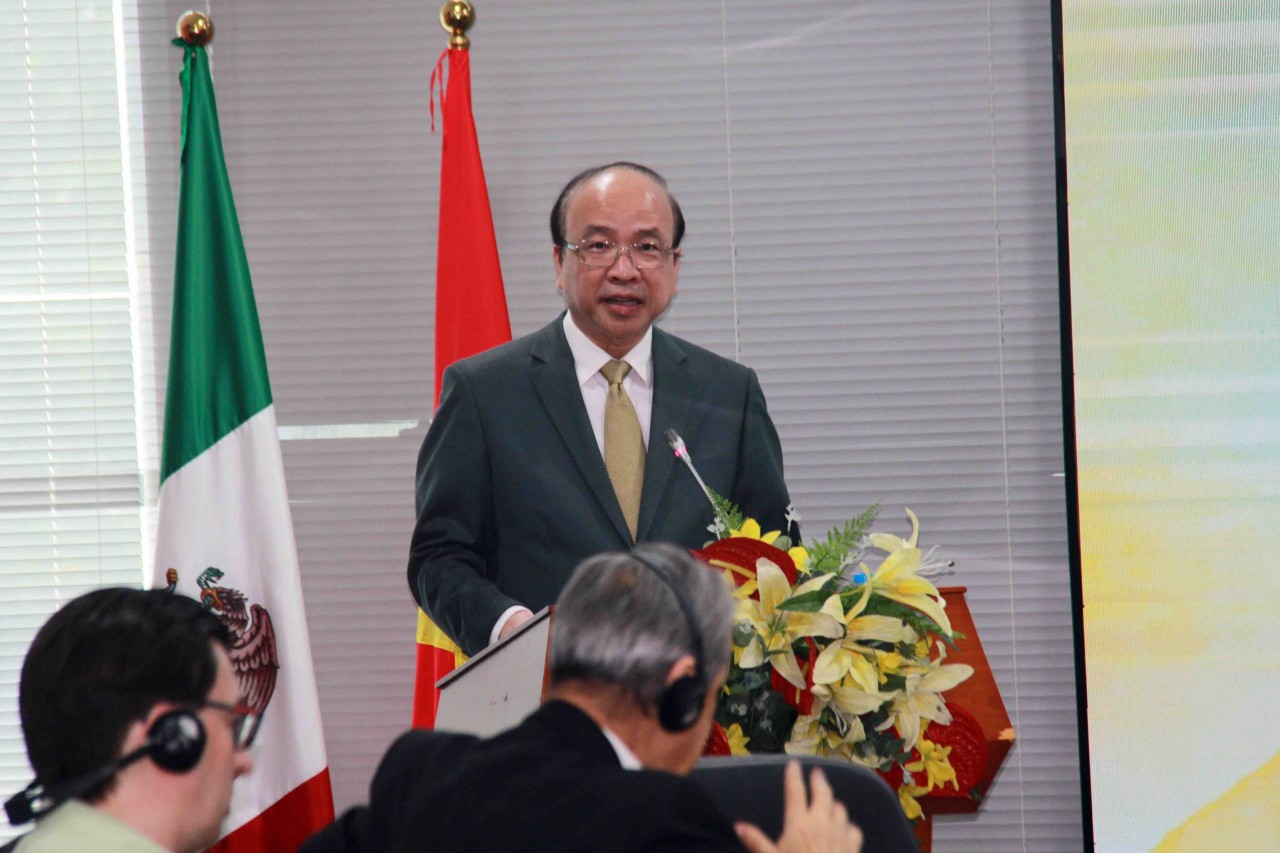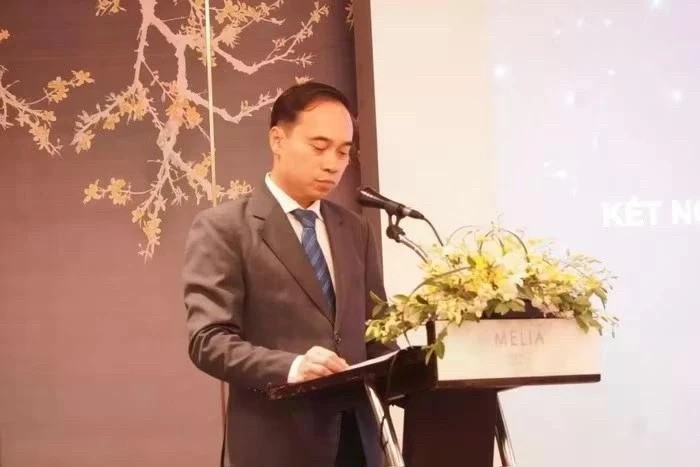Vietnam’s Expanding Role in Global Supply Chains
| Japanese Enterprises Show Interest in Recruiting Vietnamese Students | |
| Enterprises of Vietnam and the Americas Promote Business Match |
The National Scientific Conference titled "The Impact of Global Supply Chain Shifts on Vietnam's Economy" was hosted by the School of Trade and International Economics, National Economics University on the afternoon of December 25, 2024, in Hanoi.
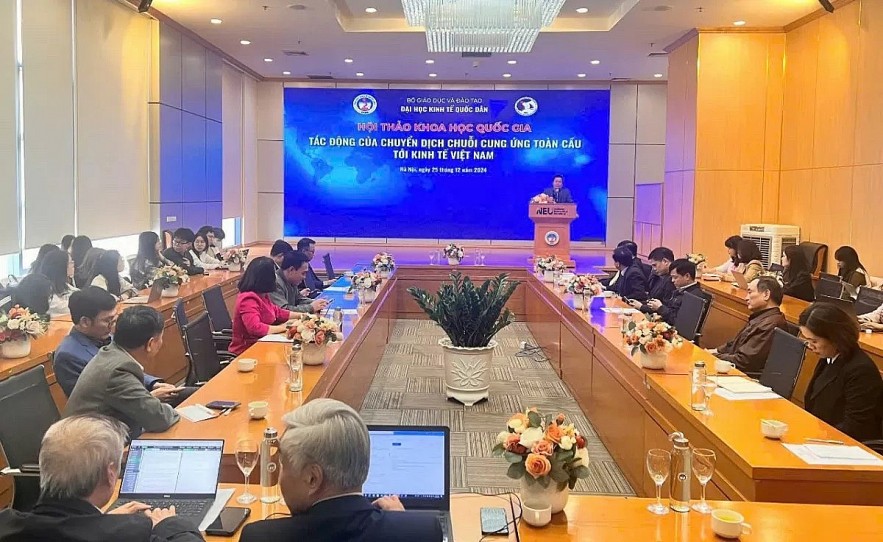 |
| The conference highlighted the importance of Vietnam seizing the opportunities arising from the global supply chain realignment. Image: QL |
Information presented at the conference highlighted that recent geopolitical upheavals, the Covid-19 pandemic, and changes in strategies of multinational corporations have transformed the structure, and flow of global supply chains. Major economies such as the US, the EU, China, and India are actively restructuring supply chains toward reshoring, diversification, regionalization, and replication.
Addressing Vietnam's positioning in these shifting supply chains and the steps needed to seize what is seen as an unprecedented opportunity to participate in global supply chains, Dinh Le Hai Ha, director of the School of Trade and International Economics, observed that Vietnam is emerging as a major manufacturing and assembly hub. This is attributed to its geographical advantages, competitive labor costs, and effective investment attraction policies. However, to fully capitalize on the global supply chain shift, Vietnam faces multiple challenges.
Key questions include how Vietnam can benefit from supply chain diversification and reduce dependence on traditional markets. What industries will be most affected, and what strategies are required to adapt? Which policies and solutions will enhance Vietnam's participation in global supply chains while mitigating risks from international volatility?
Analyzing Vietnam's readiness to participate in global supply chains, Dr. Nguyen Quoc Viet, deputy director of the Institute for Economic and Policy Research (University of Economics and Business), cited recent studies to affirm that the FDI sector has consistently been a driving force for Vietnam’s exports, and a lever for deeper integration into global value chains. However, the spillover effects of FDI in technology transfer and support for domestic enterprises remain limited. Domestic firms have yet to deeply engage in high-value-added chains, with strong linkages primarily concentrated in low- and medium-tech industries and service sectors.
"A report on the FDI efficiency index in ASEAN countries shows that in terms of technology and innovation capabilities, Vietnam ranks low—90th out of 100 countries. Specifically, it ranks 92nd in technology platforms, 77th in innovation capacity, and 73rd in FDI and technology transfer, with R&D investment accounting for only 0.2% of GDP, placing it 84th globally," Dr. Viet said.
However, he said that Vietnamese businesses could succeed by targeting niche markets where Vietnamese goods have a competitive advantage and leveraging accumulated management experience. He advised against overly ambitious pursuits of large, traditional markets requiring standards beyond current capabilities.
To enhance the position of Vietnamese businesses in global supply chains, Viet emphasized the need for a comprehensive policy framework to support domestic firms in connecting with FDI enterprises. This includes mechanisms and policies for interest rates, financing, and access to investment resources to upgrade domestic companies, enabling them to join global supply chains.
"To integrate into linkages with FDI enterprises, Vietnamese companies must improve competitiveness through strategic and operational reforms, including technological innovation, human resource development, and better management," Viet recommended.
He also proposed creating a master plan for sectors, regions, and localities, reviewing FDI capital usage, and adjusting its structure accordingly. Priorities should include strategic investors, establishing global production chains, and attracting high-tech enterprises that transfer technology to Vietnamese firms.
Meanwhile, Dr. Ta Van Loi, rector of the School of Business of the National Economics University, highlighted lessons from Vietnam's participation in global and regional supply chains. He stressed the importance of avoiding over-reliance on a few countries dominating global supply and gradually shifting production and supply chains to similar nations to diversify global sourcing.
Loi emphasized replacing long supply chains with shorter ones, increasing regional and local linkages, and fostering domestic production, especially in essential goods. He suggested taking control of agricultural and forestry supply chains and leveraging China’s food processing capabilities through channels like China Towns to promote exports globally.
He also recommended developing new technologies to produce innovative materials, products, and energy, particularly renewable energy and lightweight materials for key industries such as automotive, computing, and electronics. Additionally, he called for reorganizing rare earth zones and creating specific development plans for different types of rare earth materials.
"Establishing venture capital funds or financial partnerships for training programs to improve human resource quality and quickly access global technology is essential. Once Vietnamese firms have sufficient capital, technology, and management expertise, they can gradually rise in the supply chain and even become core enterprises within it," Loi said.
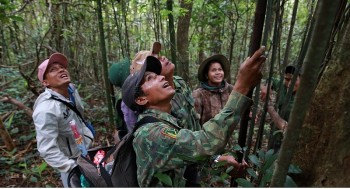 | WWF Supports Quang Tri in Promoting Sustainable Rattan Supply Chain On August 12, the People's Committee of Quang Tri province released Decision No. 1994/QD-UBND, endorsing the "Promoting sustainable supply chains, empowering communities, improving forest resilience ... |
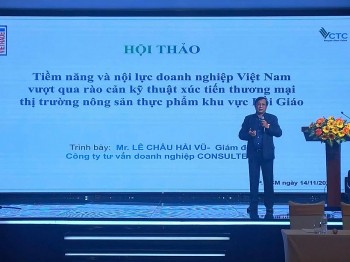 | Conference Discusses Vietnam's Potential in Supplying Halal Food Experts emphasized Vietnam's potential in the Halal product import and export market during a workshop on Halal food trade promotion. The event was organized by ... |

